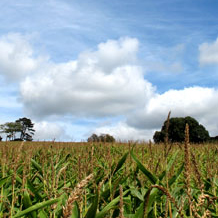- Home
- About the alliance
- Key researchers
- News
- Events
- Case studies
- Climate science: wheat can’t stand the heat
- Controlling major diseases of world crops
- Farming to feed the nation
- Food security in early modern England
- Healthy Food from Healthy Animals
- Helping UK wheat breeders through genomics
- Impacts of agriculture on greenhouse methane capture by soils
- Livestock can produce food that is better for people and the planet
- Managing sheep scab
- Parasitoid webs in organic and conventional farming systems
- Positively managing ecosystems to increase their service value
- Predicting and protecting our pollinators
- Promoting sustainable food consumption and production
- Putting a stop to pain and distress in farm animals
- Seagrass and food security
- Technology to improve water usage efficiency
- The 'push-pull' cropping system
- The North Wyke Farm Platform
- Towards sustainable agriculture
- Transparency of food prices
- Yes we (may) have no bananas
- South West Biosciences Doctoral Training Partnership
- Contact us

Understanding the affects of Trichoderma can help us towards sustainable agriculture.
Towards sustainable agriculture; exploiting the plant growth promotion and induced immunity of Trichoderma
University of Exeter
Researchers: Chris Thornton and Murray Grant
Funder: BBSRC
The University of Exeter is undertaking a project to exploit the amazing chemical diversity of soil micro-organisms such as Trichoderma.
The BBSRC funded research will improve plant growth promotion and induced immunity on a range of important plant species.
The work, lead by Dr Chris Thornton and Professor Murray Grant, is focused on understanding the bioactive molecules involved, and the plant signalling networks engaged, by a novel strain of Trichoderma hamatu.
Trichoderma has the remarkable ability to promote growth in monocots and dicots by over 30 per cent dry mass. The micro-organisms also provide enhanced resistance to a diverse range of normally dangerous root pathogens such as Rhizocotonia solani, and foliar pathogens such as rice blast fungus, Magnaporthe oryzae.
With the human population due to expand to nine billion by 2050, improvements to food production systems are needed to ensure that crop yields can meet our future food demands.
Part of these improvements will see the cultivation of the marginal land previously seen as unusable. Much of this land will have sub-optimal fertility and nutrient-poor soils requiring inputs of synthetic fertilisers to support sustainable crop production meaning that alternative strategies for sustainable crop production need to be examined.
This multidisciplinary research project combines different techniques to unravel Trichoderma bioactives, capture the plant transcriptional reprogramming induced by the bioactives, and identify key components of the signalling networks associated with increased growth and immunity.


